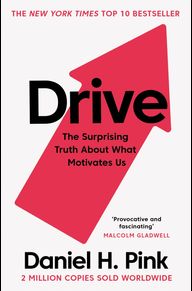59. Drive - Daniel Pink (📖)
28 Mar 2020
Reading Notes:
“When money is used as an external reward for some activity, the subjects lose intrinsic interest for the activity.”
Rewards can deliver a short-term boost – just as a jolt of caffeine can keep you cranking for a few more hours. But the effect wears off – and, worse, can reduce a person’s longer-term motivation to continue the project.
Human beings, Deci said, have an “inherence tendency to seek out novelty and challenges, to extend and exercise their capacities, to explore, and to learn.”
our third drive – our innate need to direct our own lives, to learn and create new things, and to do better by ourselves and our world.
Economics, she explained, wasn’t the study of money. It was the study of behavior.
External rewards and punishments – both carots and sticks – can work nicely for an algorithmic tasks. But they can be devastating for heuristic ones.
Adding certain kinds of extrinsic rewards on top of inherently interesting tasks can often dampen motivation and diminish performance.
If-then rewards require people to forfeit some of their autonomy.
When institutions, families, schools, businesses, and athletic teams, for example – focus on the short-term and opt for controlling people’s behavior, they do considerable long-term damage.
Try to encourage a kid to learn math by paying her for each workbook page she completes – and she’ll almost certainly become more diligent in the short term and lose interest in math in the long term.
One cannot assume that introducing or raising incentives always improves performance.
Rewards, by their very nature, narrow our focus.
Extrinsic rewards can be effective for algorithmic tasks – those that depend on following an existing formula to its logical conclusion. But for more right-brain undertakings – those that demand flexible problem-solving, inventiveless, or conceptual understanding – contingent rewards can be dangerous.
Goals that people set for themselves and that are devoted to attaining masery are usually healthy. But goals imposed by others – sales, targets, quarterly returns, standardized test scores, and so on – can sometimes have dangerous side effects.
Like all extrinsic motivators, goals narrow our focus. That’s one reason they can be effective; they concentrate the mind But as we’ve seen, a narrowed focus exacts a cost.
Cash rewards and shiny trophies can provide a delicious jolt of pleasure at first, but the feeling soon dissipates – and to keep it alive, the recipiennt requires even larger and more frequent doses.
By offering a reward, a principle signals to the agent that the task is undesirable.
Rewards can limit the breadth of our thinking.
In environments where extrinsic rewards are most salient, many people only work to the point that triggers the reward – and no further. So if student get a prize to reading three books, many won’t pick up a fourth, let alone embark on a lifetime of reading – just as executives who hit their quarterly numbers often won’t boost earnings a penny more, let alone contemplate the long-term health of their company.
We have three innate psychological needs – competence, autonomy and relatedness.
Human beings have an innate drive to be autonomous, self-determined and connected to one another. And when that drive is liberated, people achieve more and live richer lives.
An intense focus on extrinsic rewards can indeed deliver fast results. The trouble is, this approach is difficult to sustain. And it doesn’t assist in mastery – which is the source of achievement over the long haul. The most successful people, the evidence shows, often aren’t directly pursuing conventional notions of success. They’re working hard and persisting through difficulties because of their internal desire to control their lives, learn about their world and accomplish something that endures.
If you don’t pay enough, you can lose people. But beyond that, money is not a motivator. What matters are these other features.
Autonomy over four aspects of work: what people do, when they do it, how they do it and whom they do it with.
“Hire good people and leave them alone.”
We’re born to be players, not pawns. We’re meant to be autonomous individuals, not individual automatons.
“Autotelic experience”. In an autotelic experience, the goal is self-fulfilling; the activity is its own reward.
The desire to do something because you find it deeply satisfying and personally challenging inspires the highest levels of creativity, whether it’s in the arts, sciences, or business. Teresa Amabile
When what they must do exceeds their capabilities, the result is anxiety. When what they must do falls short of their capabilities, the result is boredom.
Mastery is a mindset.
“Figure out for yourself what you want to be really good at, know what you’ll never really satisfy yourself that you’ve made it, and accept that its okay.” Robert B. Reich
Flow, the deep sense of engagement that Motivation 3.0 calls for, isn’t a nicety. It’s a necessity. We need it to survive. It is the oxygen of the soul.
One of the reasons for anxiety and depression in the high attainers is that they’re not having good relationships.
The science shows that the secret to high performance isn’t our biological drive or our reward and punishment drive but our third drive – our deep seated desite to direct our own lives, to extend and expand our abilities, and to live a life of purpose.
One way to orient your life towards greater purpose is to thik about your sentence. What’s your sentence ?
Create your own motivational poster
Praise effort and strategy, not intelligence.
Flow - describes those exhilarating moments when we feel in control, full of purpose, and in the zone. And it reveals how people have turned even the most unpleasant tasks into enjoyablem rewarding challenges.
Outliers - by Malcolm Gladwell - Success is more complicated. High achievers are often the products of hidden advantages of culture, timing, demographics, and luck that helped them become masters in their fields.